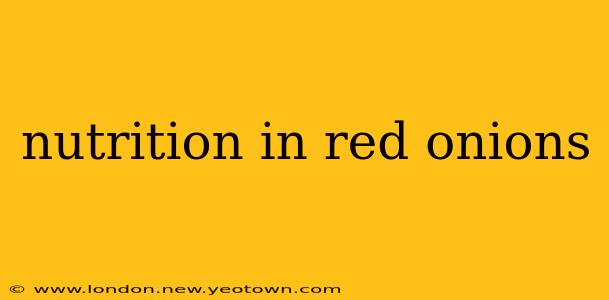Red onions, those vibrant crimson bulbs that add a zing to salads and a bite to burgers, are far more than just a culinary accessory. They're nutritional powerhouses, packed with vitamins, minerals, and beneficial compounds that contribute to overall health and well-being. Let's peel back the layers and explore the surprising nutritional benefits hidden within these colorful vegetables.
My journey into the world of red onion nutrition began with a simple question: are red onions really that good for you? What started as casual curiosity blossomed into a deep dive into the scientific literature, revealing a fascinating array of health benefits linked to regular red onion consumption. This isn't just about adding flavor; it's about adding significant nutritional value to your diet.
What are the health benefits of red onions?
The health benefits of red onions stem from their rich composition of vitamins, minerals, and bioactive compounds. These aren't just present; they work synergistically to offer a range of potential advantages. We're talking about everything from boosting your immune system to potentially reducing the risk of chronic diseases.
Red onions are an excellent source of:
- Vitamin C: A potent antioxidant that supports the immune system and protects cells from damage.
- Vitamin B6: Crucial for brain development and function, as well as red blood cell formation.
- Folate (Vitamin B9): Essential for cell growth and development, particularly important during pregnancy.
- Potassium: An electrolyte that helps regulate blood pressure and fluid balance.
- Manganese: A mineral involved in bone health, wound healing, and metabolism.
- Quercetin: A flavonoid with potent antioxidant and anti-inflammatory properties. This is where much of the red onion's magic lies.
Are red onions good for blood pressure?
Yes, red onions can contribute to maintaining healthy blood pressure. Their potassium content helps to counteract the effects of sodium, while the quercetin and other antioxidants help to relax blood vessels, improving blood flow. However, it's crucial to remember that red onions should be part of a holistic approach to managing blood pressure, alongside a balanced diet, regular exercise, and potentially medication as prescribed by a doctor. They aren't a miracle cure, but they can certainly play a supportive role.
Are red onions good for cholesterol?
Studies suggest that the compounds in red onions, particularly quercetin, may help lower LDL ("bad") cholesterol levels. This is another area where the antioxidant and anti-inflammatory properties of red onions come into play. Again, this isn't a standalone solution for high cholesterol, but a valuable addition to a heart-healthy lifestyle that includes diet, exercise, and potentially medication as advised by your healthcare provider.
What are the benefits of eating red onions every day?
Incorporating red onions into your daily diet can offer a range of potential benefits, including:
- Improved immune function: Thanks to their vitamin C and other antioxidant content.
- Reduced inflammation: Quercetin's anti-inflammatory properties can help combat chronic inflammation linked to various health problems.
- Better blood sugar control: Some studies suggest that red onions may help regulate blood sugar levels.
- Enhanced heart health: The effects on blood pressure and cholesterol contribute to cardiovascular well-being.
- Improved digestive health: Red onions contain prebiotics that nourish beneficial gut bacteria.
However, it’s crucial to note that these are potential benefits, and individual responses may vary. A balanced diet is key, and relying solely on red onions for health benefits isn't advisable.
Are red onions better than white onions?
While both red and white onions offer nutritional benefits, red onions often contain higher levels of certain antioxidants, like quercetin, thanks to their vibrant color. This doesn’t necessarily make them "better," but it highlights a potential difference in their nutritional profiles. Ultimately, both types of onions are valuable additions to a healthy diet.
Conclusion: The Humble Onion, A Nutritional Champion
From boosting immunity to potentially supporting heart health, the humble red onion offers a surprising array of nutritional benefits. Its vibrant color is a visual cue to its powerful internal composition, a testament to the incredible bounty nature provides. While not a magic bullet, the consistent incorporation of red onions into a balanced diet represents a simple yet impactful step towards better health and well-being. Remember to consult with a healthcare professional for personalized dietary advice.

